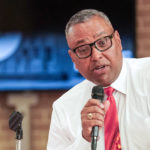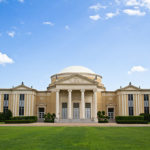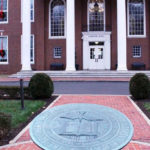FAIRFAX STATION, Va. (BP)—The National African American Fellowship of the Southern Baptist Convention issued a statement asking presidents of SBC seminaries to take steps to help defuse current racial tensions within the convention.
The March 24 statement encourages all Southern Baptists “to unite around the essentials of our faith, and in the nonessentials, maintain a spirit of charity,” focused on living out the Great Commandment in pursuit of the Great Commission.
Marshal Ausberry, who is the fellowship’s president and also first vice president of the SBC, said the fellowship is “trying to make a pathway forward that works for all of us.”
Ausberry, pastor of Antioch Baptist Church in Fairfax Station, Va., said the statement was a response to questions he and others have been asked by African American pastors since a meeting in January of a multi-ethnic group of Southern Baptist leaders.
During that meeting, held virtually, NAAF officers and the seminary presidents addressed turmoil resulting from several statements issued by SBC-affiliated groups concerning critical race theory and race relations.
“We felt we really needed a public comment that expressed where we are,” said Ausberry of Wednesday’s statement.
Critical race theory and seminary presidents
The conflict initially was sparked by a statement issued Nov. 30, 2020, by the Council of Seminary Presidents condemning “racism in any form,” but saying “affirmation of critical race theory, intersectionality and any version of critical theory is incompatible with the Baptist Faith & Message.”
On behalf of NAAF, Ausberry issued a response Dec. 11 affirming the Bible as supreme and sufficient, but recognizing “there are ideologies from a sociological and anthropological perspective when used appropriately, help us to better understand the inner workings of a fallen and sinful world.”
On March 24, Ausberry said: “We are not defending CRT, [that] has been misconstrued. We felt the seminary presidents’ statement went too far in dismissing CRT in all its forms.”
Sign up for our weekly edition and get all our headlines in your inbox on Thursdays
In its statement, the fellowship said “certain limited insights from CRT, not as an ideology or worldview, can be useful to identify and repudiate racial bias and systemic racism in organizations and institutions. We believe that discussions on systemic racism and racial injustice requires understanding, patience, and grace.”
Asking seminary presidents to act
With the goal of “bringing healing and a better understanding among Southern Baptists,” NAAF asked the seminary presidents to:
- Cohost open forums with the fellowship on biblical approaches to addressing systemic racism.
- Require in curriculum a course on the historical and theological understanding of race and racism in America.
- Acknowledge that in their statement Nov. 30, the seminary presidents were “speaking for their seminaries and not for the SBC.”
The Dec. 11 statement by NAAF said ideologies do not supplant the supremacy of Scripture and “where such ideologies conflict with Scripture, it is Scripture that governs our worldview, our decisions, and our lives.”
Ausberry reiterated that commitment on March 24, but he said the seminary presidents’ November statement “had the effect of dismissing the lived experience of African Americans with racism in America.”
“We keep hearing that resoundingly throughout the pastors we’ve talked with,” Ausberry said, “that they have been disappointed—and their congregations, a number of pastors said their congregations are examining, because of the seminary presidents’ statement, whether they remain in the convention.”
Ausberry said the purpose of the latest statement by the fellowship was to “truly, from a heartfelt standpoint, to share sincerely and objectively where the African American pastors are coming from, and striving to be helpful and not hurtful.”
Expressed desire to work together
In a joint statement after the January meeting of SBC leaders, participants described “an honest and open conversation, hearts to hearts,” and committed to continuing conversations “to work together to serve the cause of and to further the work of the Southern Baptist Convention.” They also said they were “committed to listen to one another, speak honestly and to honor our common commitment to the inerrant Word of God and the Gospel of Jesus Christ.”
The issue of critical race theory and intersectionality has been percolating in the SBC since messengers to the 2019 SBC Annual Meeting passed Resolution 9, which affirmed the sufficiency and supremacy of Scripture and rejected the embrace of critical race theory as a worldview, while suggesting it “should only be employed as analytical tools subordinate to Scripture.”

In response to the March 24 statement by NAAF, Danny Akin, president of Southeastern Baptist Theological Seminary, said the seminary presidents “speak for ourselves and our seminaries alone,” and noted that in the November statement, the Council of Seminary Presidents was “seeking to speak clearly about the teachings on each of our campuses.”
“We do not speak for the Southern Baptist Convention, but we are accountable to it, to teach in accordance with and not contrary to the Baptist Faith and Message,” Akin said in a statement provided to Baptist Press. “It was in that spirit and in light of current conversations in our convention that we addressed the issues of both racism and CRT.”
Akin said the seminary presidents “remain committed to condemning and fighting racism in every form, personal and structural, in consistency with the 1995 SBC Resolution on Racial Reconciliation and the Baptist Faith and Message. We also want to move forward together and foster seminary campuses that make brothers and sisters from every tribe, tongue, people and nation welcome.”
Akin said SBC seminaries have implemented and attempted “a number of efforts to that end,” but said they “always welcome further recommendations and suggestions.”
“We know much work remains, and we will seek to be faithful to Christ as we all work together to proclaim the gospel, build the church and reach the nations,” Akin said.
In its March 24 statement, the fellowship echoed the sentiment and asked “all Great Commission-minded believers” to pray and seek unity in the Great Commandment—Jesus’ call for believers to love God “with all your heart and with all your soul and with all your mind,” and to “love your neighbor as yourself.”
“As we continue to work with the [seminary presidents] and SBC leaders,” NAAF wrote, “we call on all Southern Baptists to pray that the Spirit of Christ will enable us to demonstrate greater sensitivity in our actions with every tribe, language and peoples.”













We seek to connect God’s story and God’s people around the world. To learn more about God’s story, click here.
Send comments and feedback to Eric Black, our editor. For comments to be published, please specify “letter to the editor.” Maximum length for publication is 300 words.